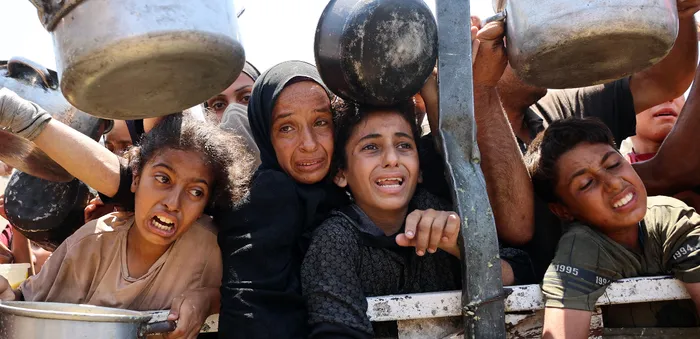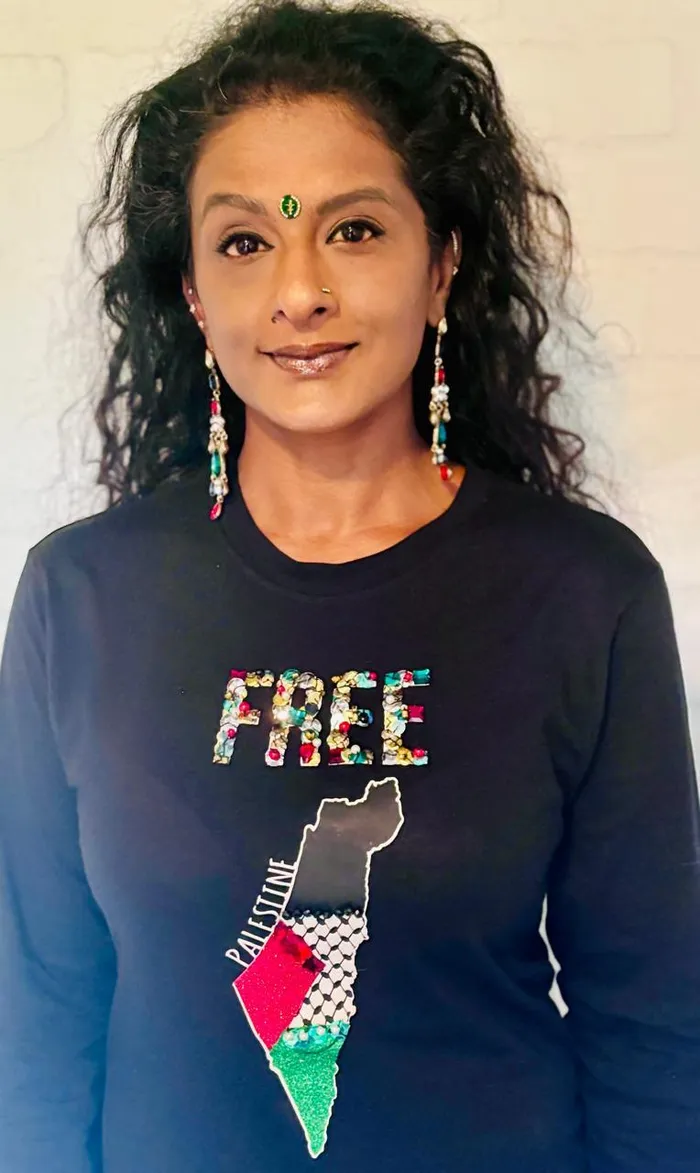
Palestinians receive lentil soup at a food distribution point in Gaza City. The World Health Organization warned that malnutrition was reaching "alarming levels" in Gaza.
Image: Omar AL-QATTAA / AFP
IN THE shadow of history’s darkest chapters, a tragedy of catastrophic and colossal proportions has and continues to reach new levels of depravity daily, demanding we confront what it means to be human.
Today, as the world watches the systematic suffering in Palestine, where children starve and civilians are reduced to mere numbers in a relentless conflict, we must ask: have we learned nothing from the past? The cries from Gaza, echoing the horrors of Auschwitz, pierce through the noise of indifference, urging us to reclaim our humanity before it slips irretrievably away.
The starvation of children in Palestine is a visceral wound on our collective conscience. Forced starvation, a weapon as cruel and deadly as any bomb, has become a tactic in this conflict, reducing entire populations to desperation. The United Nations warns of famine, yet the international response remains tepid, mired in political calculations rather than moral imperatives.
This is not a distant statistic but a reality etched in the gaunt faces of children, their ribs protruding like the bars of a cage. What we permit today is what we would have tolerated and remained silent about in the past, history’s living judge will not spare us.
The global concept of humanity, once a beacon of hope after the Holocaust, now teeters on the brink. The Universal Declaration of Human Rights promised never again, yet here we are, witnessing a genocide in real-time. Hashtags like #IsraelTerroristState and #PalestineAction trend as desperate pleas, holding leaders accountable. Our inaction writes a verdict alongside the enablers of past atrocities. History is presently shaping itself, and the space we occupy will be judged not by titles but by deeds or lack thereof.
Manipulating historical trauma to sanitise the current genocide in Palestine is an insidious betrayal. The Holocaust, a scar on Jewish history, should unite us against all suffering, not justify new horrors. The Palestinian experience, decades of occupation, displacement, and now starvation, demands its own recognition, not a footnote to another narrative. To deny this fractures the shared dignity that binds us as humans.
Children, the most innocent casualties, bear the brunt of this moral failure. Their starvation is deliberate, a fact that should ignite global outrage. Yet, neutrality persists, a shrug of shoulders mirroring those who watched the rise of Nazism.
Leaders must face this: your silence is a legacy you cannot escape. When a child cries out, bloodied and broken, hungry and afraid and there is no parent left alive to hold that child, it becomes the moral obligation of every single mother and father across this planet to answer to that cry. We could weep tsunamis of tears as we watch the cruel and calculated extermination of a people and still it will never be enough to drown out the despair of what we are all witness to.
This is a moment of reckoning. The need for humanity has never been more urgent. It demands more than sympathy, it requires action. Governments must impose sanctions, open humanitarian corridors, and enforce laws protecting civilians. Individuals must advocate, raise awareness, and refuse to accept the unacceptable. The Palestine Action movement is a call to resist where others have fallen silent.
What about the hostages? What about October 7th ? The defenders of this cruelty shout in an attempt to legitimise the cruelty. The bitter truth endures, not even the lives of the hostages matter to those who have exploited that very thing to justify and fuel their campaign of terror. October 7th a terrible and dark day and one that in all its profound horror tore open the world’s eyes to the ongoing oppression and occupation in the open air prison that is Palestine.
This minute, this second of this day in 2025 the clock ticks for justice, for humanity. The images of starving children, the wails of bereaved mothers, and the ruins of Gaza are not abstract, they are the test of our humanity. We must reject the middle ground, choosing life over death, compassion over indifference. We cannot undo the past, but we can shape the future.
The question is not whether we can act, but whether we will. For if we do not, the echoes of Auschwitz will not be history’s only lesson, Palestine will be our enduring shame. Humanity knows no race or religion, it is the fundamental universal binding thread that links us as people.
To see your own child reflected in the eyes of the dying child taking his last breath as a camera live streams it, to hold your own child and feel their warm body and know a mother somewhere is cradling the lifeless body of hers – to feel and to know it’s only though some stroke of luck and geography that we are here and not them there and that alone should compel every human being with an ounce of humanity to speak out, to act - as we would hope others would do for us if the tables were turned.
Palestine is the litmus test we cannot afford to fail. The moral compass points in one direction as it has been for hundreds of days now, let Palestine not become the planet’s altar at which everything that it is to be profoundly humane within each of us, goes to die. Humanity must be resurrected.

Vanessa Govender
Image: Supplied
Vanessa Govender is a former SABC radio and award winning ENCA television news reporter. She is an author of the children’s book, The Selfish Shongololo, the best selling memoir, Beaten But Not Broken, and the recently released memoir, The Village Indian.
** The views expressed do not necessarily reflect the views of IOL or Independent Media.
Related Topics: